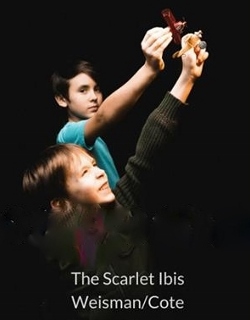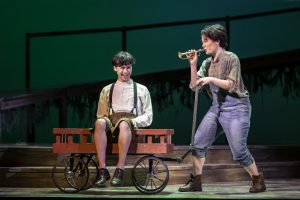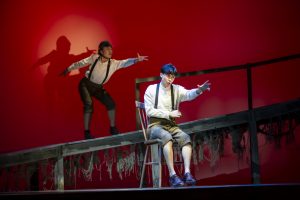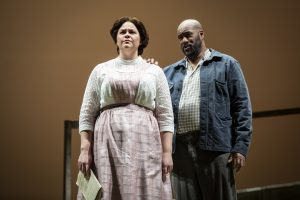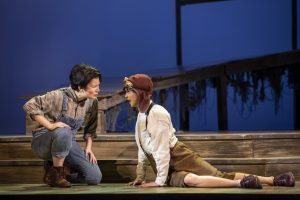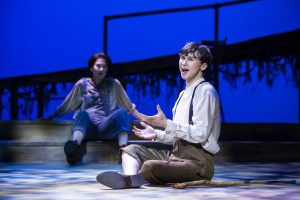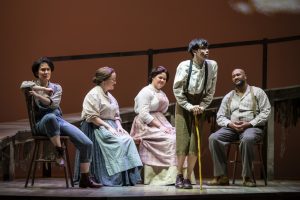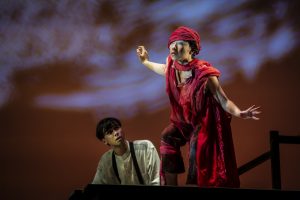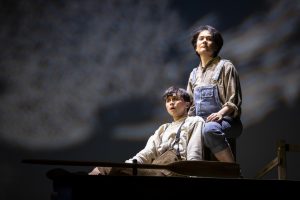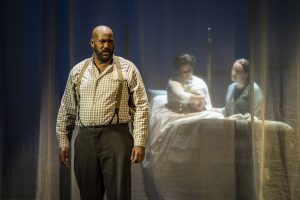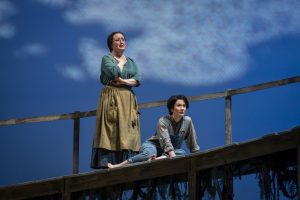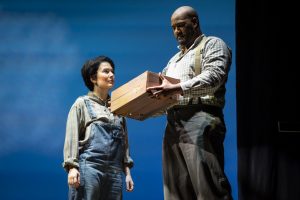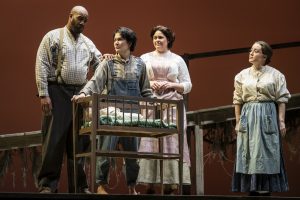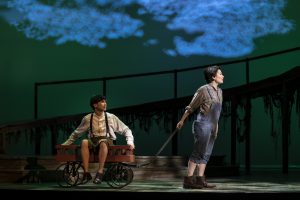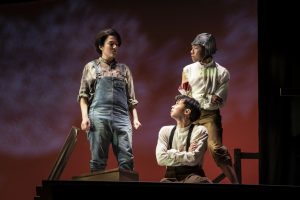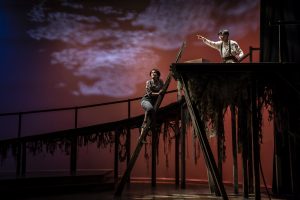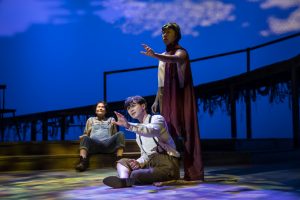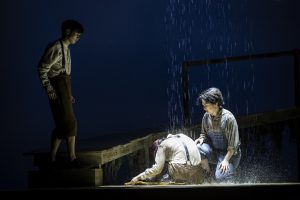A SMALL STORY SOARS
IN THIS NEW OPERA
Right now the Studebaker Theater houses a wonder. A chamber opera with a heart of gold, The Scarlet Ibis, with a supple score by Stefan Weisman and lyrical libretto by David Cote, is based on a 1960 short story by the late James Hurst. In only 95 minutes this potent 2015 offering, now in a sweetly shaped production by Chicago Opera Theater, spins a small-scale but deeply detailed tale of love gone wrong.
Its backdrop is an almost idyllic North Carolina coastal town before and into World War I. (Jack Magaw’s set imagines a curving, moss-ridden wooden jetty at Horsehead Landing, surrounded by a cyclorama that paints a dozen kinds of skies.)
Steeped in nature and the luxurious laziness of boyhood, Hurst’s bittersweet saga is felt from the perspective of Brother (Annie Rosen cast with strategic gender-bending), an all-American kid with more energy than goals. He will age from six to twelve in the course of the opera.
But its full focus is on his younger brother William Armstrong (Jordan Rutter), called “Doodle” because he seemed to walk backwards like the bug. A frail child born from a difficult childbirth as a “caul baby,” gifted and cursed with a big but weak heart, the child is thought by his wary Mother (Quinn Middleman) and superstitious Auntie (Sharmay Musacchio) to have a short, doomed life: Father (Bill McMurray), a carpenter who can read wood, makes a premature coffin.
But, refusing to die, Doodle turns out to be one of the most remarkable survivors in any opera. Delighting in everything pretty, Doodle persists. Brother is thrilled to have this smiling sibling. He’s excited over their future reenacting the Civil War and the Wild West.
But Brother’s eagerness carries a cost: Calling him “a cripple runt freak,” this bit of a bully refuses to take Doodle’s lameness as a permanent plight. For this tough-loving lad, there’s only one way to be a boy. It’s all about action.
Brother puts him in a red wagon and pulls him around, finally getting Doodle to walk with a crutch. This success inspires Brother to take him out on adventures to a haunted swamp where Doodle, he hopes, will learn to fish, run, climb, fight and row a boat. He can finally be “normal.” As World War I begins, Brother’s pretend-play and Doodle’s “training” take on a new realism.
But Doodle is much happier and better at improvising hymns, vaudeville novelty numbers, and enchanting “lies” that reveal a constant creator. Doodle’s imagination does everything his body can’t, conjuring up fantasies of protective peacocks and of taking flight — and an instant bond with a scarlet ibis (Ginny Ngo). This beautiful red tropical bird, blown way north of its migration route by a storm, has made their swamp its final stop. Doodle euphorically wonders about all the things the bird has seen, more grist for the busy mill of his mind. Doodle solemnly buries it — to the mockery of his family.
Doodle’s fate is linked to the scarlet ibis — and the storm that destroyed it — in more ways than he can imagine. Or that Brother can prevent. As Brother says in the short story, “I did not know that pride is a wonderful, terrible thing, a seed that bears two vines, life and death.”
Little things carry great weight here, like an owl that comes out of a coffin or the many creatures that populate the marshland. They add up to multiple epiphanies, most feelingly in the boys’ a cappella duet at the end.
What’s so wrenching is that Doodle’s story is no simple pep rally about triumphing over adversity or a wrong being righted. It’s about how sterling but misplaced intentions can prove as wrong as the worst ones.
The spiky and spartan score, movingly conducted by David Hanlon and performed by a nine-person orchestra, signals all the twisted sentiments in the earth poetry of Cote’s sardonic script. Director and movement coach Elizabeth Margolius fully trusts that text and inspires tensile performances from six superb singer-actors.
Memorable and remarkable is Annie Rosen as big Brother, challenging and subversive in a role that incarnates an athletic boy’s shallow concept of masculinity. Everything that Brother couldn’t know at the time the audience feels in his place.
And then there’s young counter-tenor Jordan Rutter, whose disabled Doodle, enthrallingly sung and exuberantly immediate, embodies the mind on wings. Doodle’s zest for beauty anywhere radiates in every note. It’s no accident that Rutter gets to sing the work’s most involved and melodious passages. His voice is a gift for every ear.
In the end Doodle is that once-and-future misfit who, though he never meant to for a second, improves on life just by being different. He may be too good for this world but he’s perfect for this opera.
photos by Liz Lauren
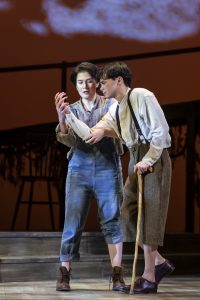 The Scarlet Ibis
The Scarlet Ibis
Chicago Opera Theater
Studebaker Theater, 410 S. Michigan Ave.
ends on February 24, 2018
for tickets, call 312.704.8414 or visit COT
for more shows, visit Theatre in Chicago
